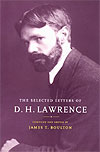
The Selected Letters of D.H. Lawrence
Edited by James T. Boulton
For those people—and there are many of them—who don't enjoy Lawrence's novels, who find his views on women naive or his political views resistible, the letters reveal another part of his life that I think is very poignant. In the earliest volume, the letters concern his first job, the first books he read and his first visits to the theater (he managed to see Sarah Bernhardt in 1908). He's an innocent, zealous, open-minded fellow. Across the years, you read of how he was persecuted for his work and of his own phenomenal restlessness—all coalescing into feelings of rejection and disappointment. His emotions are absolutely laid bare, revealing a surprising sense of humor and a ferocious energy. The artist as tortured genius is absolutely reflected in these pages. He talks at one stage about that great work of art, a man's life—and that's what we find in this collection.
Edited by James T. Boulton
For those people—and there are many of them—who don't enjoy Lawrence's novels, who find his views on women naive or his political views resistible, the letters reveal another part of his life that I think is very poignant. In the earliest volume, the letters concern his first job, the first books he read and his first visits to the theater (he managed to see Sarah Bernhardt in 1908). He's an innocent, zealous, open-minded fellow. Across the years, you read of how he was persecuted for his work and of his own phenomenal restlessness—all coalescing into feelings of rejection and disappointment. His emotions are absolutely laid bare, revealing a surprising sense of humor and a ferocious energy. The artist as tortured genius is absolutely reflected in these pages. He talks at one stage about that great work of art, a man's life—and that's what we find in this collection.
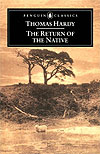
The Return of the Native
By Thomas Hardy
This is a titanic book—reminiscent of Wuthering Heights in that it's one of those great, dark romances where the landscape plays such an important role. I found it impossible not to be swept up in the story of Eustacia Vye and Clym Yeobright. This book is an extraordinary epic that shows human behavior—particularly with regard to love and ambition and jealousy—in its most extreme and passionate forms. It's almost exhausting to read; it feels as if it goes into the bowels of the Earth and into the very hearts of the characters.
By Thomas Hardy
This is a titanic book—reminiscent of Wuthering Heights in that it's one of those great, dark romances where the landscape plays such an important role. I found it impossible not to be swept up in the story of Eustacia Vye and Clym Yeobright. This book is an extraordinary epic that shows human behavior—particularly with regard to love and ambition and jealousy—in its most extreme and passionate forms. It's almost exhausting to read; it feels as if it goes into the bowels of the Earth and into the very hearts of the characters.
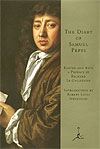
The Diary of Samuel Pepys
By Gerald G. Jampolsky, M.D.
The diary offers a microscopic view of nearly ten years of one of the most striking periods in English history, from 1660 through 1669, starting with the Restoration of the monarchy after the Civil War. It’s only been about 200 years since academics discovered a way to understand Pepys’s curious shorthand, which covered up things he thought would be politically dangerous. He was in touch with both ends of the social scale, and so he gives you everything: the life of the king, the life of the court-which was full of fascinating characters-and his own domestic arrangements.
Pepys is a man of such fantastic appetite, a rather gifted musician, a lover of gossip and women, and a great survivor. The story of how he navigates a politically tumultuous period, during which people were in and out of royal favor with great regularity, is fascinating. But it’s the naked honesty with which he writes, every foible, every unpleasant characteristic revealed, that makes him, to me, one of the most endearing characters in the whole of English literature, and indeed English history.
By Gerald G. Jampolsky, M.D.
The diary offers a microscopic view of nearly ten years of one of the most striking periods in English history, from 1660 through 1669, starting with the Restoration of the monarchy after the Civil War. It’s only been about 200 years since academics discovered a way to understand Pepys’s curious shorthand, which covered up things he thought would be politically dangerous. He was in touch with both ends of the social scale, and so he gives you everything: the life of the king, the life of the court-which was full of fascinating characters-and his own domestic arrangements.
Pepys is a man of such fantastic appetite, a rather gifted musician, a lover of gossip and women, and a great survivor. The story of how he navigates a politically tumultuous period, during which people were in and out of royal favor with great regularity, is fascinating. But it’s the naked honesty with which he writes, every foible, every unpleasant characteristic revealed, that makes him, to me, one of the most endearing characters in the whole of English literature, and indeed English history.
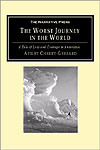
The Worst Journey in the World
By Apsley Cherry-Garrard
This is the most beautifully written account of exploration—specifically, polar exploration—that we have. Cherry-Garrard was a young classics scholar who traveled to the Antarctic with Robert F. Scott's last expedition in 1910, and he conveys in such a vivid way what it was like to be on a wooden sailing ship at that time. The "worst journey" is a trip that he and two other explorers make to find the eggs of the emperor penguin, a trip on which the three men walk hundreds of miles and survive, among other horrific circumstances, a cataclysmic storm and having their tent blown away. The simplicity of Cherry-Garrard's language is deceptive: The physical rigors he and his companions suffer make you shiver, and his admiration for those he works for is unbounded; but he's so matter-of-fact, never suggesting that in his own case there was any great heroism involved (though clearly there was). The later account of the failed attempt to rescue Scott, something that haunted him for the rest of his life, is unbearably moving and unbearably tragic. I first read the book about 12 years ago, and it started my interest in the heroic age of Antarctic exploration. And, of course, I reread it when preparing to play Ernest Shackleton.
By Apsley Cherry-Garrard
This is the most beautifully written account of exploration—specifically, polar exploration—that we have. Cherry-Garrard was a young classics scholar who traveled to the Antarctic with Robert F. Scott's last expedition in 1910, and he conveys in such a vivid way what it was like to be on a wooden sailing ship at that time. The "worst journey" is a trip that he and two other explorers make to find the eggs of the emperor penguin, a trip on which the three men walk hundreds of miles and survive, among other horrific circumstances, a cataclysmic storm and having their tent blown away. The simplicity of Cherry-Garrard's language is deceptive: The physical rigors he and his companions suffer make you shiver, and his admiration for those he works for is unbounded; but he's so matter-of-fact, never suggesting that in his own case there was any great heroism involved (though clearly there was). The later account of the failed attempt to rescue Scott, something that haunted him for the rest of his life, is unbearably moving and unbearably tragic. I first read the book about 12 years ago, and it started my interest in the heroic age of Antarctic exploration. And, of course, I reread it when preparing to play Ernest Shackleton.
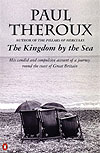
The Kingdom by the Sea
By Paul Theroux
Theroux reintroduced me to my own country. He traveled the coast, describing the differences not just in the terrain but also among the people. The off-season is very beguiling, and Theroux is so good at capturing that strange British determination to go and enjoy the seaside regardless of the weather, a tradition encapsulated in the familiar image of people driving their motorcars up to the edge of a shingled bank and just sitting there with a thermos of tea and a few sandwiches, staring out at the rain. He makes Britain seem vast. We sometimes feel, particularly these days, that we are a tiny island and insignificant. But the diversity here is striking, even if in this case all the elements he describes fall under the bracket of the English seaside.
By Paul Theroux
Theroux reintroduced me to my own country. He traveled the coast, describing the differences not just in the terrain but also among the people. The off-season is very beguiling, and Theroux is so good at capturing that strange British determination to go and enjoy the seaside regardless of the weather, a tradition encapsulated in the familiar image of people driving their motorcars up to the edge of a shingled bank and just sitting there with a thermos of tea and a few sandwiches, staring out at the rain. He makes Britain seem vast. We sometimes feel, particularly these days, that we are a tiny island and insignificant. But the diversity here is striking, even if in this case all the elements he describes fall under the bracket of the English seaside.
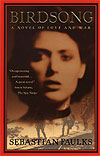
Birdsong
By Sebastian Faulks
The author has taken a subject that is much written about and filmed—World War I—and explored it in a particularly fascinating way with this story of the tunnelers, the men who dug beneath the front lines. Our chief image of this war, if you think about it, is of people attacking from trenches, and we feel we know that awfulness and desolation. Less familiar is the idea that you might be tunneling under no-man's-land, a few feet away from a German tunnel, but the enemy hears you first and blows you up. The claustrophobia of that experience, described to us by the main character, Stephen, is striking and horrifyingly realized. Although I initially found the stuttering and jumping between the battle and Stephen's passionate encounters with his lover Isabelle a little jarring, by the end I felt the stories added up to something outsize, something ambitious with pleasing rough edges.
By Sebastian Faulks
The author has taken a subject that is much written about and filmed—World War I—and explored it in a particularly fascinating way with this story of the tunnelers, the men who dug beneath the front lines. Our chief image of this war, if you think about it, is of people attacking from trenches, and we feel we know that awfulness and desolation. Less familiar is the idea that you might be tunneling under no-man's-land, a few feet away from a German tunnel, but the enemy hears you first and blows you up. The claustrophobia of that experience, described to us by the main character, Stephen, is striking and horrifyingly realized. Although I initially found the stuttering and jumping between the battle and Stephen's passionate encounters with his lover Isabelle a little jarring, by the end I felt the stories added up to something outsize, something ambitious with pleasing rough edges.




